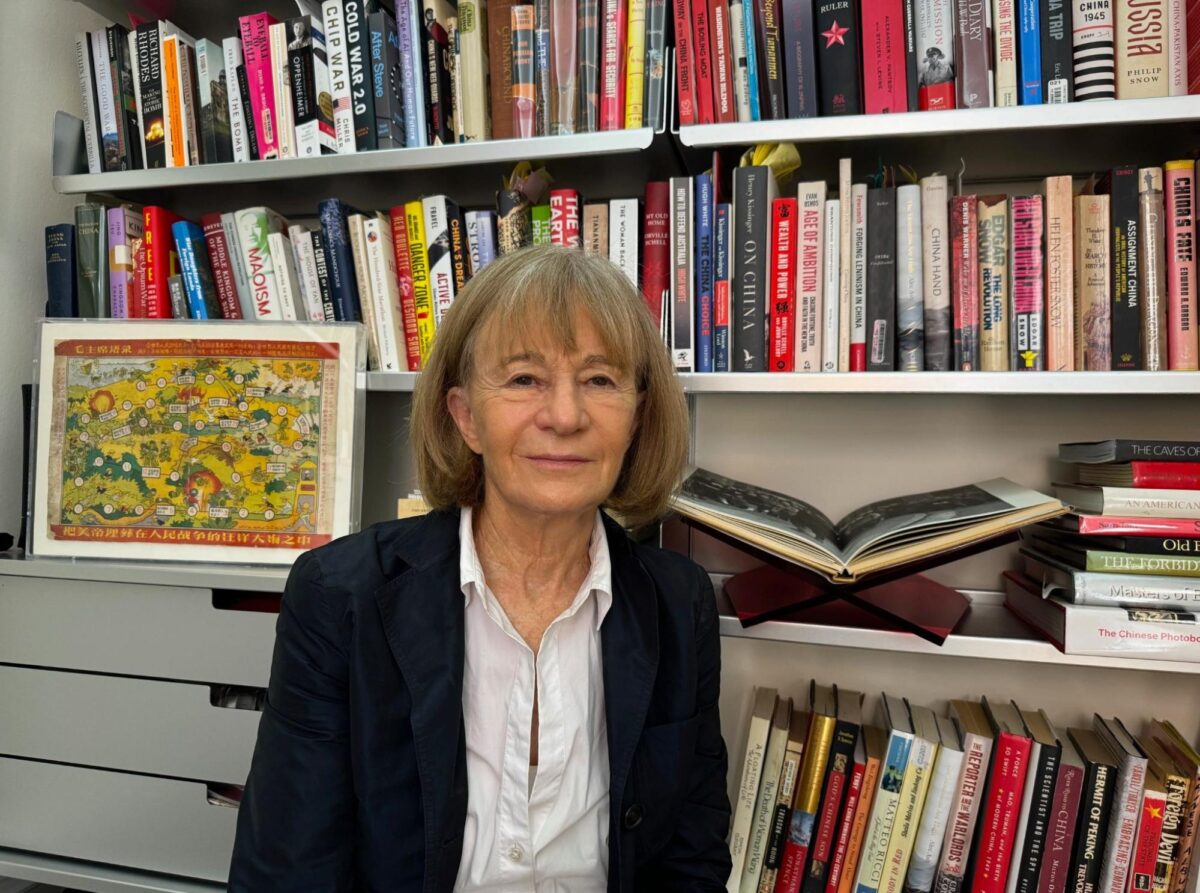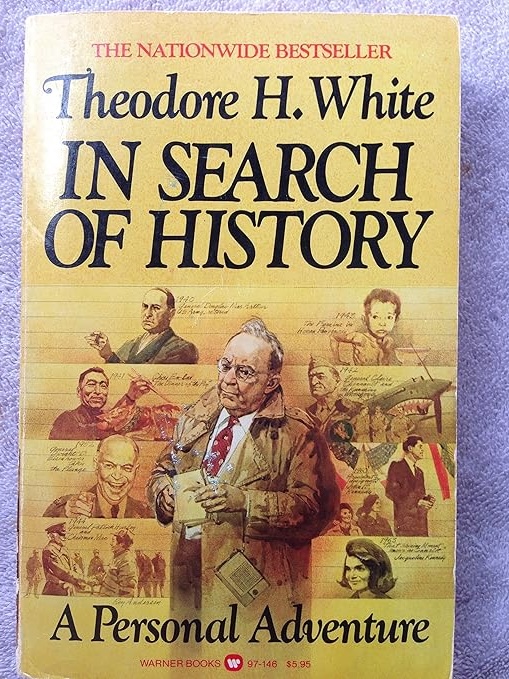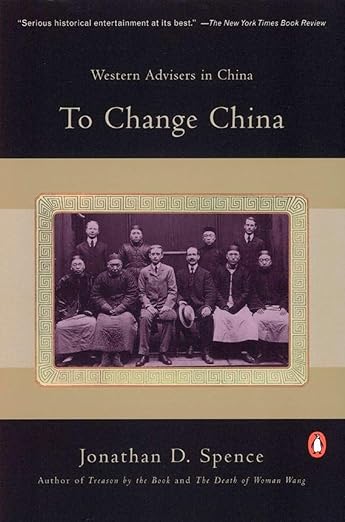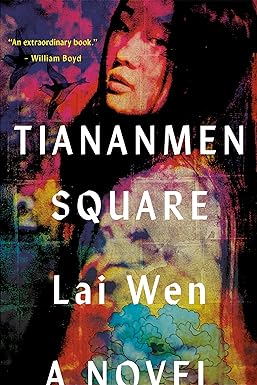Sign up for our newsletter to be notified of new posts!

Jane Perlez is an American journalist and podcaster. She was a foreign correspondent for The New York Times in East Africa, Central Europe, Indonesia and Pakistan, chief diplomatic correspondent, and Beijing bureau chief from 2012-2019. In 2009 her team won the Pulitzer Prize for reporting in Pakistan and Afghanistan. She now produces podcasts about the U.S. and China, most recently Face-Off: U.S. vs China with Rana Mitter as co-host, the second season of which is out soon. Perlez was born in London, grew up in Australia, and lives in New York.
In the new installment of this column, we caught up with Perlez to ask about her collection of China-related books — and for a selection of five interesting titles from her shelf.
When did you start collecting books on China, and how did your shelf expand?
I first went to China during the Mao era while I was at university in Australia, studying 20th-century European and American history. A group of about 50 students, of all political leanings, traveled by train through the major cities in eastern China for three weeks. My first China books, which I read in preparation for the trip, were about 20th-century Chinese history, particularly WWII, and post-1949. I moved to New York a few years later. My enduring interest became relations between the U.S. and China, a fascination I was able to pursue as a New York Times correspondent covering China from 2012 to 2019.
I collected books while living in Beijing, including some from my favorite All Sages Bookstore (万圣书园) in northeast Beijing. Sadly, those books from Beijing, about 100 or so of them, have yet to be retrieved from storage. But some of them survived, including a family album published by Chen Xiaolu, son of the foreign minister during the Mao years, Chen Yi. I treasure an anthology of English Verse in Chinese and English edited by Jin Liqun, head of the Asia Infrastructure Investment Bank. And I keep a corner of one of the upper shelves for old guidebooks of Beijing and Shanghai, which show how American and British travelers — some of them stiff-upper lipped missionaries, some debauched characters with money to burn — saw China before modernization.
Where is the collection now, and how do you organize it?
Most of my China books are squeezed onto one wall of my study on the Upper West Side of Manhattan. I’m lucky to have Vitsoe bookshelves: I like the clean lines and cool feel of the steel. Since most of the books are non-fiction, they are roughly arranged by period. One shelf is dedicated to my reporter colleagues and antecedents in China, starting with Edgar Snow, then Theodore White, followed by New York Times correspondents — too many to name here. At the edge of one shelf, I keep a range of books on nuclear war — Hiroshima by John Hersey, The Bomb by Fred Kaplan — as a reminder of the stakes of the U.S.-China relationship.
My bookshelf is heavily tilted toward biography, memoirs, history. I have a shelf I think of as “Big Men and Women.” Biographies of Mao Zedong, Deng Xiaoping, Chiang Kai-shek, Madame Chiang Kai-shek, Chiang Ching-kuo, and most recently Zhou Enlai. I also prize biographies of American players in the China drama, for example, Daniel Kurtz-Phelan’s The China Mission, an exquisite account of George Marshall’s frustrating effort to stop the Communist victory in the Chinese Civil War. I have a number of accounts of Nixon and Kissinger’s diplomacy with Beijing, including The Nixon Tapes, 1971-1972 by Douglas Brinkley and John Holdridge’s Crossing The Divide, the story of how Kissinger’s secret trip came to be. And tucked on a shelf beside the journalist books is a smattering of fiction, such as The Woman Back from Moscow by Ha Jin.

What else lives on your bookshelf?
I love photography books. One collection that I keep open on a bookstand on the shelf under the journalists’ books is Le Petit Livre Rouge D’Un Photographie Chinois by Li Zhensheng, a Chinese photographer who was in his mid-20s when Mao launched the Cultural Revolution. He was assigned to record monks being humiliated, politicians with their heads bowed, students reveling in the humiliation of their elders. Many of his images were published in the state-run newspapers, but Li stored the most dramatic images under his floorboards, and in 2003, his collection was published in France, with a forward by the sinologist Jonathan Spence. To the right and left of Li’s book, I stack other photography and larger travel books. From One China to the Other by Henri Cartier Bresson and The Chinese Photobook by Martin Parr and WassinkLundgren are two classics, and I’m also happy to have a 1931 copy of Juliet Bredon’s Peking.
At the far left end of the bookshelf stands a Chinese board game dating from the Cultural Revolution, titled “Bury the American Imperialists in the Boundless Ocean of the People’s War.” The game is laid out in violent yellow and red colors; you play it by blowing up the enemy, including tunnel warfare. I acquired the game from Asia Bookroom, a delightful depository of collectible Asia books and ephemera in Canberra, Australia. I admire it as a worthy piece of history, so it’s encased in an expensive, handcrafted standup frame.
One shelf is dedicated to my reporter colleagues and antecedents in China, starting with Edgar Snow, then Theodore White, followed by New York Times correspondents.
Jane Perlez’s bookshelf picks
In Search of History
A Personal Adventure
Theodore H. White
January 1, 1978
Warner Books
This book is my favorite account of life as a journalist in China. Candid, knowing, full of “I was there” detail. Teddy White (as he was affectionately known) was based in China for Time magazine — specifically Chongqing — during WWII. He traveled to Yan’an, the Communist stronghold, and wrote about how he was entranced by Zhou Enlai in the 1940s, even though he knew Zhou’s dark side. His description of seeing Zhou in 1972 during the Nixon visit to China is a classic. White writes that he felt belittled by the scrum of camera crews and TV anchors who were given preferential access during Nixon’s visit. When Zhou walks by the press, the Premier sees White. “But that is Teddy White,” Zhou says, adding in a scolding tone: “He has not come back to China since liberation.”
To Change China
Western Advisors in China
Jonathan D. Spence
January 1, 2002
Penguin Publishing Group
I recommend this book to Westerners visiting China for the first time, or for important trips. I gave a battered copy to Nicholas Burns before he left to become U.S. Ambassador in Beijing. For China hands, Spence’s collection may seem old hat. But for business people, diplomats and students, his collection of essays about foreigners in China are a cautionary tale. He illustrates how all the good will in the world — and Western enthusiasm for reform and democracy — does not translate so well into Chinese culture. Spence’s selection of characters is smart, from 17th-century Jesuit missionary Adam Schall, to the head of American forces in the 1940s, General Albert C. Wedemeyer. The overriding message from Spence is that all these people left China, mission unaccomplished.
China Hand
An Autobiography
John Paton Davies, Jr.
February 3, 2012
University of Pennsylvania Press
Davies was born in China in 1908, the child of American Baptist missionaries. He joined the U.S. Foreign Service in the 1930s and returned to China to navigate between the Nationalists and the Communists. In this memoir he recounts how he told his handlers in Washington about the corruption inherent to Chiang Kai-shek’s Nationalist army, and how he advised the State Department to start talks with Mao Zedong. He served as an aide to General Joseph Stilwell, leader of the U.S. forces in wartime China, and later joined the American embassy in Moscow as the China advisor under the American diplomats W. Averell Harriman and George F. Kennan. When he returned to Washington, he was dismissed for leftist political views. This is a stark account of the perilous territory wartime China proved to be for American diplomats, but it also serves as a sobering rejoinder for our own times.
Agents of Subversion
The Fate of John T. Downey and the CIA’s Covert War in China
John Delury
October 15, 2022
Cornell University Press
John Delury uses his huge skills at historical narrative in this nonfiction work recounting the crazy decision by the CIA to launch an anti-communist “Third Force” in China in the early 1950s. He zeroes in on the two young, inexperienced CIA agents who were flown into northern China in a C-47 military transport aircraft to exfiltrate one of the operatives on the ground. The plane crashes, and the two agents — John T. Downey and Richard G. Fecteau — are captured and held in Chinese jails for 20 years, until their release as part of the diplomacy with China by Nixon and Kissinger in the early 1970s. Delury is a first-rate historian who got access to previously closed documents, and I used this harrowing tale as the foundation for an episode on espionage in my podcast.
Tiananmen Square
A Novel
Lai Wen
June 4, 2024
Spiegel & Grau
Lai Wen, a Chinese writer now living in Britain, has accomplished what few contemporary novelists writing about China have been able to do: she takes the reader inside an urban Chinese family. Her novel, set in Beijing in the 1970s and 80s, is a lightly fictionalized account of her childhood growing up in working-class Beijing. It’s a coming-of-age novel told with sensitivity, wit and a sense of the period. As an outsider to the culture, I felt Lai Wen brought me into the house — her mother’s overbearing attitude, her father’s remoteness. She was a clever student, though her family doesn’t celebrate her brilliance. She goes to Peking University, and joins a group of students resisting the Communist Party. As the ultimate showdown on the square in June 1989 shatters all hope, she manages to flee abroad. Lai Wen is a pen name, and for the sake of her family she will not reveal her true identity. ∎







